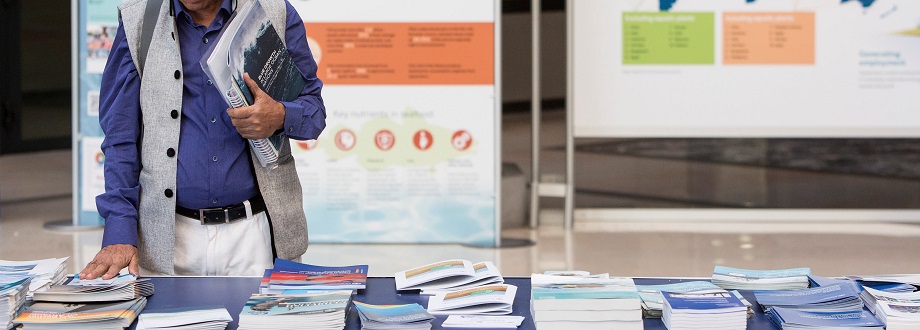Publications

Category: Deep Seas & Biodiversity
Type of document: Reports
The Common Oceans ABNJ Deep Seas Project is funded by the Global Environment Fund and implemented by FAO and the UN Environment Programme. The partnership brings together a broad range of partners, including regional fisheries bodies responsible for the management of deep-sea fisheries, fishing industry partners, and international organizations to achieve sustainable fisheries management and biodiversity conservation of deep-sea living resources in the ABNJ. To showcase existing knowledge, practices and innovative research for sustainable deep-sea fisheries management and biodiversity conservation in the ABNJ, the Food and Agriculture Organization of the United Nations (FAO), in collaboration with UN Environment World Conservation Monitoring Centre (UNEP-WCMC) and the SponGES Project consortium, organized a meeting – the ABNJ Deep Sea Meeting 2019 – that took place on 7-9 May 2019, at FAO Headquarters in Rome, Italy. Over 40 participants, including representatives from partner organizations and other stakeholders from multiple sectors within the ABNJ, attended the three-day meeting. While significant progress has been made in the management of deep-sea fisheries and in the protection of vulnerable marine ecosystems, the ABNJ still faces threats from climate change, ocean acidification, biodiversity loss, and pollution. Building on the achievements of the Common Oceans ABNJ Deep Sea Projects and the SponGES Project, the participants were invited to give presentations on key topics and discuss emerging issues concerning ABNJ governance and deep-sea research, monitoring and management.

Category: Deep Seas & Biodiversity
Type of document: Reports
The relevance of connectivity for marine biodiversity has been recognised in the negotiations for a new international legally binding instrument for the conservation and sustainable use of biodiversity of areas beyond national jurisdiction. This technical brief provides evidence to support future negotiations. It explains how connectivity can be considered in negotiations on three of the four ‘package elements’ of the instrument: area-based tools, environmental impact assessments and technology transfer and capacity building. This technical brief provides an opportunity to consider appropriate ways to include ecological connectivity in order to support the delivery of the ecosystem approach.
This brief was produced under the auspices of the ABNJ Deeps Seas Project funded by the Global Environment Facility. This is a 5-year project jointly implemented by the Food and Agriculture Organization of United Nations (FAO) and United Nations Environment Programme (UN Environment) in partnership with regional fisheries bodies, Regional Seas Programmes, the fishing industry, international organziations and governments.

Category: Deep Seas & Biodiversity
Type of document: Technical papers
This publication presents the outcome of a meeting between the FAO/UNEP ABNJ Deep-seas and Biodiversity project and the Deep Ocean Stewardship Initiative. It focuses on the impacts of climatic changes on demersal fisheries, and the interactions of these fisheries with other species and vulnerable marine ecosystems. Regional fisheries management organizations rely on scientific information to develop advice to managers. In recent decades, climate change has been a focus largely as a unidirectional forcing over decadal timescales. However, changes can occur abruptly when critical thresholds are crossed. Moreover, distribution changes are expected as populations shift from existing to new areas. Hence, there is a need for new monitoring programmes to help scientists understand how these changes affect productivity and biodiversity.
Learning from experience: case studies of area-based planning in ABNJ A review of area-base
25 March 2019
25 March 2019

Category: Deep Seas & Biodiversity
Type of document: Reports
A number of analyses have been undertaken to inform the development of a methodology to support application of cross-sectoral area-based planning in areas beyond national jurisdiction by parties to Regional Seas Conventions and their Secretariat.
This report constitutes one such analysis and explores four case study regions in which area-based planning has occurred in areas beyond national jurisdiction: Eastern Central (EC) Pacific; Mediterranean; North East (NE) Atlantic; and Southern Ocean. The four case study regions demonstrate a variety of different contexts and methods for area-based planning in areas beyond national jurisdiction.

Category: Deep Seas & Biodiversity
Type of document: Reports
The third Project Steering Committee (PSC) meeting of the ABNJ Deep Seas Project was held at WCMC headquarters in Cambridge, United Kingdom from 17-18 April 2018. The meeting was attended by representatives of 13 project partners, including the FAO and UNEP-WCMC.
The primary objective of this PSC meeting was to discuss the results of the Mid-Term Review (MTR), which covered the time period from the project start date to December 2017.

